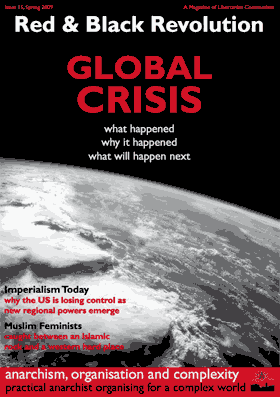Over 30 years of anarchist writing from Ireland listed under hundreds of topics
Global Political Repercussions of the capitalist crisis
As soon as the scale of the crisis became clear, all rhetoric about free-markets and competition vanished. Bankers, capitalists and right wing politicians were all suddenly huge believers in the role of the state and the importance of regulation.
It took no time at all for the bankers and various other troubled industries to start demanding public money to bail them out. This showed just how thin capitalism’s ideological layer is - they will believe anything and say anything as long as it is in their own immediate interests to do so. Thus far, the neoliberal governments of the world, with their hatred for government interference have poured more than $10 trillion into bailing out their banks. However, the chain reaction of the collapse in the real economy has caused even more fundamental shifts in economic policy.
Keynsianism
The U.S. government amongst many others has responded to the crisis by adopting programs of economic stimulus. This amounts to a re-birth of the economic thinking of John Maynard Keynes, whereby countries spend their way out of recessions by borrowing heavily and using the money to provide jobs and capital to ‘stimulate’ the economy, in order to counteract the negative feedback loops that recessions cause. Keynsianism was traditionally associated with Social Democratic policies and the welfare state, so its new popularity marks a fundamental shift from neoliberalism. However, the scale of the crisis and the fact that it is occurring on a global level means that such responses, alongside the cost of the bank bailouts, have caused an explosion in demand for international credit at precisely the time when it is least available.
China
Due to its large export sector, China is one of the principal creditors between states. However, the slow-down in the Chinese economy is likely to cause unrest amongst the huge and volatile Chinese working class. Whether China can continue to serve as a major international creditor in the long term is uncertain.
USA
The massive cost of the crisis will put pressure on the imperial role of the US. Their public finances will increasingly constrain their ability to serve as the “world’s policeman.” Significant changes are in motion, exactly how they will turn out is impossible to say, but the world will be different.
This article from Red & Black Revolution 15, Spring 2009 was first published as part of The neoliberal origins of the global capitalist crisis

This article was first published in
Red & Black Revolution 15, Spring 2009
[Download the PDF]

